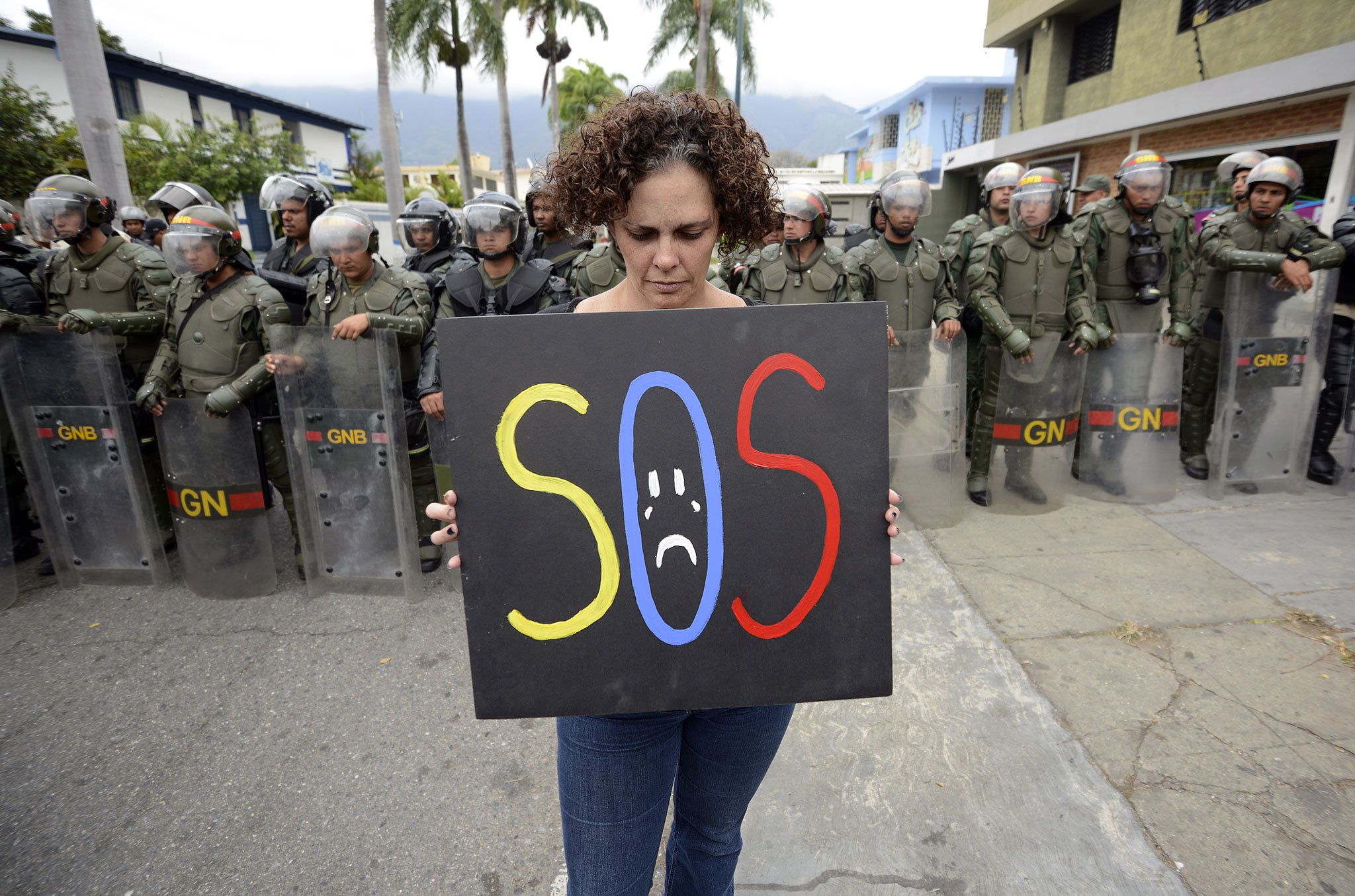Owen Jones: Socialism’s critics look at Venezuela and say, ‘We told you so’. But they are wrong
The democratic credentials of the post-Chavez government are being maligned

Here's the right-wing narrative. The Venezuelan people have taken to the streets in huge numbers against a human rights-abusing regime. The response has been murderous repression, with each death damning evidence of a monstrous autocracy. The government's economic policies have caused nothing but ruination for the population, demonstrating once again that “socialism” is an abject failure. Those who challenge this narrative, like myself, are nothing but dupes, useful idiots, the modern-day equivalents of the Fabians who went to Stalin's Soviet Union and lauded it as a new civilisation.
So let's have some context. Before Hugo Chavez was elected President in 1998, Venezuela was ruled by various neo-liberal administrations. In 1975, 15 per cent of Venezuelans lived in poverty; two decades later, it had surged to 45 per cent. When Venezuelans protested against the then President Pérez - who U-turned on election pledges to abandon neo-liberalism in 1989 - the full might of the state was unleashed on them in the so-called “Caracazo”, a Tiananmen Square-style massacre in which hundreds of protesters were slaughtered.
Repulsed by the traditional political elite, Venezuelans delivered Chavez a landslide victory in 1998. At the time, he advocated the Third Way approach championed by Tony Blair, but his key strategy was to use oil riches to fund social programmes. Poverty rates collapsed from 50 per cent to around 25 per cent; extreme poverty was reduced by two-thirds. According to the UN, this represents the second-biggest percentage-point drop in poverty in Latin America. The traditional bastion of neo-liberal dogma, the World Bank, reveals that, while Venezuela's gross national per capita income languished below the continent's average before Chavez came to power, it is now $13,120, higher than Brazil or Argentina, and against an average of $8,981. Despite recent economic troubles, the UN revealed that Venezuela enjoyed the region's biggest drop in poverty in 2012.
Does this mean that Venezuela is some sort of paradise? No. Inflation runs at over 50 per cent: but it is a disease the country is long familiar with. Under Chavez's neo-liberal predecessor Rafael Caldera in the 1990s, it topped 100 per cent. And yet this was not presented as a failure of free-market capitalism. The law-and-order situation is simply unacceptable, exacerbated by various factors: neighbouring Colombia's civil war; a society that’s awash with guns; and an ineffective police force riddled with corruption. Neither should the government's support for tyrannies in Syria and Libya be overlooked, though given Western support for vile dictatorships such as Saudi Arabia – and Tony Blair's lucrative employment by Kazakhstan's dictatorship – let's not overdose on the hypocrisy.
But take a look at the behaviour of the opposition. In 2002, Chavez was overthrown by a Western-backed Pinochet-style coup, vigorously incited and backed by a private media that made Fox News look like pinko liberals. And yet – almost uniquely – a popular uprising returned the elected government to power. Imagine if our elected government was overthrown by a junta, which killed numerous innocent people in the process, and the whole thing was cheered on by ITN and Sky News. What would be the aftermath?
One of the leaders of the current protests is Leopoldo Lopez, who was involved in the 2002 coup and helped arrest Chavez's Interior Minister. The unrest demands the government's “exit” only a few months after the opposition lost municipal elections. Molotov cocktails, rocks and fireworks have been thrown. Steel wire has been fitted to Opposition barricades, and at least two people have been garotted. Among those shot dead are pro-Government activists, including an MP's brother. That does not in any sense excuse the deaths of opposition supporters: in all cases, the circumstances must be investigated, and those responsible apprehended, whoever they are. Military police officers have been arrested for killing one Government supporter and one opposition activist. But here is what is perverse: those loudest in cheering on often violent anti-government protests in Venezuela are those who would tolerate them least if they happened in this country.
As for the government's much-maligned democratic credentials, when Chavez was elected in 1998, he received 3.7 million votes against the opposition's 2.6 million. In 2013, his successor Nicolás Maduro received 7.6 million votes, against the opposition's 7.4 million. The leap in the number of votes is not down to a population explosion: many were not even registered to vote until the government's registration drives. International observers have repeatedly declared every election to be free; in 2012, former US President Jimmy Carter hailed Venezuela's election process as “the best in the world”. When Chavez lost a constitutional referendum in 2007, he accepted it.
State media is clearly biased in favour of the government. But it has a derisory audience share, and the dominant private media remains biased in favour of the opposition, even if it is less strident than it was once. In 2007, the government refused to renew the radio broadcast licence of RCTV because of its support for the coup: it was wrong to do so, as some Chavistas accept, but it continues to broadcast via satellite and cable.
Venezuela is one of the world's most polarised nations. Talks must happen; the dead need justice; the government must guarantee freedoms; violent disorder must end. But one thing is clear. Those who relish using Venezuela's troubles for political point-scoring have no interest in the truth.
Read more
James Bloodworth: The left has a blind spot on Venezuela. When will it acknowledge that Chavez's socialist dream has turned into a nightmare?
Owen Jones: Hugo Chavez was a democrat, not a dictator, and showed a progressive alternative to neo-liberalism is both possible and popular
Join our commenting forum
Join thought-provoking conversations, follow other Independent readers and see their replies
Comments
Bookmark popover
Removed from bookmarks